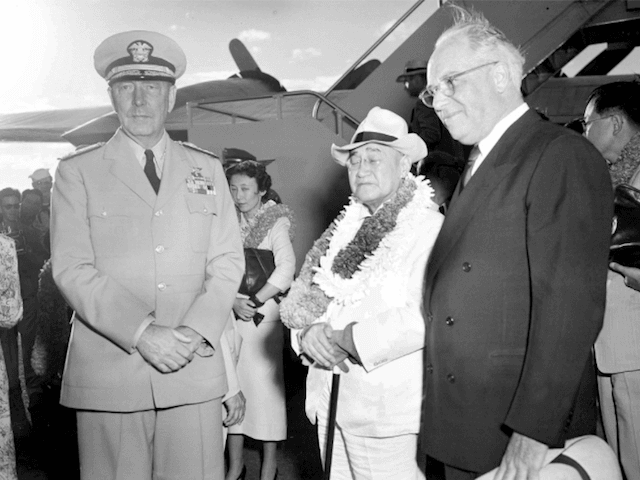Although the historic nature of Japanese Prime Minister Shinzo Abe’s visit to Pearl Harbor this week is stressed by both American and Japanese officials, he is not actually the first Prime Minister of Japan to make such a visit.
Japan’s The Mainichi daily reports Tokyo has confirmed three of Abe’s predecessors made Pearl Harbor visits in the 1950s, despite public announcements that Abe would be the first.
Chief Cabinet Secretary Yoshihide Suga said the Japanese Foreign Ministry has “confirmed materials” documenting visits by Shigeru Yoshida, Ichiro Hatoyama, and Nobusuke Kishi, who was Shinzo Abe’s grandfather.
Photographs of Hatoyama and Kishi’s visits were published by Japanese media last week, producing a bit of a stir among the public, due to unequivocal statements by their government that Abe was the first sitting PM to make such a visit. Abe will certainly be the first Japanese Prime Minister to pay public tribute at the USS Arizona memorial.
“Prime Minister Abe would also be the first to mourn the victims jointly with a U.S. president,” added Suga.
The Associated Press recounts Prime Minister Shigeru Yoshida’s visit in 1951, just six years after Japan surrendered in World War II. He was on his way home after signing a historic peace treaty in San Francisco, and asked to pay a courtesy call on Admiral Arthur Radford, commander of the U.S. Pacific Fleet. The meeting was a little tense at first, because Radford’s office overlooked the wreckage of the Arizona, but his Scottish terrier broke the ice by making friends with dog fancier Yoshida.
“Years later, Yoshida told Radford’s wife how he was embarrassed when he walked into the office after seeing Pearl Harbor, and how happy he was that the dog was able to settle him down,” the AP writes.
The New York Times notes in a report on the significance of Abe’s high-profile visit to Pearl Harbor that Japanese students of today are taught surprisingly little about the attack. “Most young people don’t know much about the war,” said history teacher Katsutoshi Chujo. “They know about Japan as a victim in Hiroshima, Nagasaki and the Tokyo air raids.”
“Several textbooks used in public schools describe it as a surprise attack on the United States that followed a long campaign in China. But a textbook that takes a more nationalist view and that has been approved by the Education Ministry portrays the attacks as being forced by American demands and describes Japan as waging a war of ‘self-defense,'” the New York Times reports.
The NYT also observes that while Japanese “nationalist right wing” groups scuttled Emperor Akihito’s plans to visit the USS Arizona memorial in 1994, those quarters of the Japanese political spectrum seem comfortable with Abe finally making a public visit, with one Japanese “far-right” paper editorializing that it would present “an opportunity to refresh a commitment to deepen the U.S.-Japan friendship and contribute peace to the world through a tranquil ceremony.”
Bloomberg News – which quietly acknowledges the fresh details about low-key PM visits in the past by describing Abe’s visit as “the first by a sitting Japanese prime minister in decades” – anticipates he will use the event to kick off a year focused more heavily on foreign policy and diplomacy than domestic economic concerns.
Like the New York Times, Bloomberg mentions that Japanese politicians are nervous about President-elect Donald Trump’s criticism that U.S. allies are not shouldering enough of the burden for their defense, especially with the growing Chinese threat in the South and East China Seas. Trump’s critique of the Trans-Pacific Partnership trade deal is also mentioned as a cause for concern by Abe, who strongly supports TPP.
This transforms Abe, “long seen as a nationalist and traditionalist” in Bloomberg’s estimation, into a champion of globalism and internationalism. It will interesting to see what he’s prepared to do, in order to preserve a relationship with the United States grown more vital than ever, beginning with what he’s prepared to say at the USS Arizona memorial.

COMMENTS
Please let us know if you're having issues with commenting.